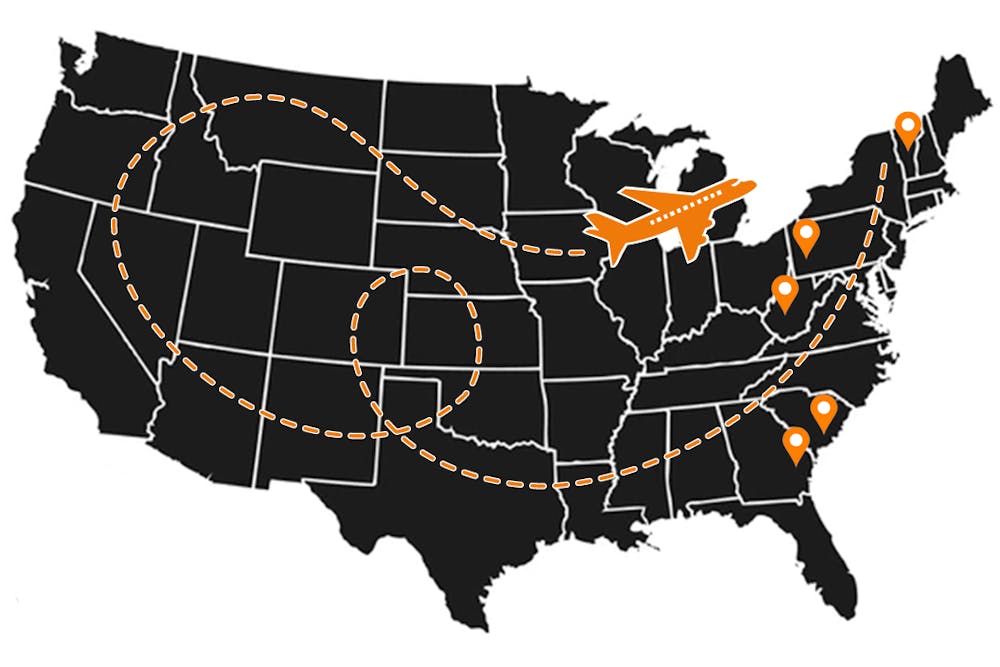At home, the job of Eleanor Wright ’28 was to feed the pigs.
Wright grew up on a farm on the edge of Bulloch County in Statesboro, Ga., where she woke up at 6 a.m. and drove over to the pig pen on her ATV.
“For many people here, if they grew up on a farm, it’s more like their parents’ passion project. For me, it was a livelihood,” she said.
For all the Princeton students that hail from New York City or central New Jersey, there are also students from smaller and more geographically isolated towns like Avella, Penn. and Bethel, Vt. In interviews with The Daily Princetonian, students from rural and small-town America described the process of adjusting to Princeton as difficult, but following a familiar arc: While a rural background might be initially isolating, students realize over time that digging into differences actually helps to create meaningful relationships.
Leyton Watts ’26 has called Charleston, W. Va. home his entire life and had never travelled internationally. Nor did he participate in many high school activities available to his peers, like lacrosse and Model UN. “To be fair, I’m not sure how much of the aforementioned experiences could be chalked up to me being a rural student, but my lack of access to things definitely made me feel different,” he said.
Based on Frosh Surveys for the Class of 2029, 2028, 2027, and 2026, less than 10 percent of students in each class year come from rural towns like Watts.
Josh Lanch ’28 is from Avella, a town in western Pennsylvania with a population of approximately 700. His high school of 40 students had limited course offerings, so he ended up graduating early because they “ran out of stuff to teach me,” he said.
Though his rural background created social barriers upon his arrival at Princeton, it also helped Watts become more comfortable in forming relationships with people who share different experiences. “Ultimately, embracing my identity as a West Virginian helped me to stand out and individualize myself. I've come to value my difference in perspective because it's made conversations more interesting once you actually start talking to people just beyond surface level,” he said.

Lanch also discovered that college was an opportune place to develop cultural literacy, a skill that was difficult to attain in Avella. “Names were hard for me at first because I had never encountered any ethnic names,” he said. “I think it's fun whenever people have an ethnic name, but they choose to go by an American name. I usually ask them if they mind if I call them by their traditional name.”
“I think it’s cool to connect with other cultures. It feels like everyone here has a desire to understand other people as well,” Lanch added.
Wright said she wanted to attend Princeton so that she would be exposed to different beliefs and ideas outside of her homogenous community in Ga. “I grew up in a Christian school with very conservative circles,” she said. “I wanted to break out of the bubble.”
Despite opportunities to develop community on campus, Anita Miller ‘28, from Bethel, Vt., a town of approximately 1,900 people, believes that the University needs to better address a lack of rural representation in the student body.

“I think geographical diversity is a really overlooked aspect of admissions right now,” she said.
Multiple factors contribute to the lack of representation of rural students in higher education, including fewer course options in high school curriculums, geographic isolation, and economic disadvantages.
“I think that a rural student group could be a nice thing for Princeton to have. There are definitely unique experiences that come with being from a rural background,” Miller said.
Watts posited that a lack of college outreach in small towns is one of the main reasons that rural students are not well-represented in higher education. “I think that would have benefitted a lot of people back home,” he said.
On campus, the Freshman Scholars Institute (FSI) and Scholars Institute Fellows Program (SIFP) offer affinity groups for first-generation, low-income students, some of whom are from rural areas. However, none of the students that were interviewed were aware of this initiative.
“I would have liked to see more programming dedicated to rural students, maybe more of an outreach effort on behalf of the University,” Watts said.
“We know that many students from rural communities associate with different aspects of the first-generation and/or lower-income (FLI) identity, and benefit from participating in programs like the Freshman Scholars Institute (FSI), FSI Online, and the Scholars Institute Fellows Program (SIFP), which support Princeton students during the transition to and journey through the [U]niversity,” University spokesperson Jennifer Morrill wrote in an email to the ‘Prince.’
Being from a close-knit community, Wright expressed difficulty in adjusting to Princeton. “Even though it’s considered a small college, it's a lot bigger than anything I'm used to,” she said. Having an association that reaches out to rural students would be really helpful.”
Other institutions have partnered with organizations that increase college outreach to rural students. For instance, universities like Yale, Vanderbilt, and Stanford have collaborated with the Small Town and Rural Students (STARS) College Network to improve pipeline programs and recruitment efforts for prospective students from these areas.
Watts is working to create a Rural Students Association that incorporates college outreach and community building for rural students and makes space for non-rural students to learn more about their peers.
Transitioning to an institution like Princeton can be tough for any student, but a rural upbringing provides students with niche perspectives in college. Even among rural students, there is a great diversity of life experiences which can make Princeton feel foreign.
“There is no one definition of ‘rural,’” said Watts. “It’s a lifestyle. Not often by choice.”
Synai Ferrell is a staff Features writer and staff Podcast writer at the ‘Prince.’
Please direct any corrections requests to corrections[at]dailyprincetonian.com.








